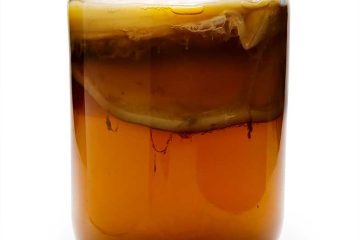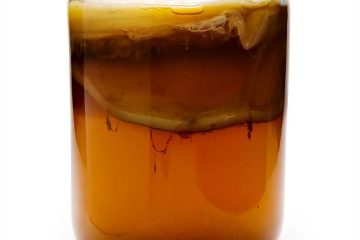kombucha tea liver damage

As the world embraces healthier beverage options, the popularity of kombucha tea has soared. However, amidst its touted benefits lies a looming concern – the potential for liver damage. Delving into the realm where wellness meets caution, this article explores the intricate balance between the supposed perks of kombucha tea and the emerging discourse surrounding its impact on liver health. Unraveling the myths and truths behind this fermented elixir, let’s embark on a journey to uncover the mysteries of kombucha tea and its possible effects on the liver.
Table of Contents
- Understanding Kombucha Tea and its Potential Impact on Liver Health
- Key Factors Contributing to the Debate on Kombucha Tea and Liver Damage
- Expert Insights: How to Safely Incorporate Kombucha Tea into Your Diet
- Practical Tips for Monitoring Liver Health While Consuming Kombucha Tea
- Q&A
- Key Takeaways

Understanding Kombucha Tea and its Potential Impact on Liver Health
When it comes to the intricate balance of health and wellness, exploring the potential impacts of kombucha tea on the liver unveils a realm of curiosity and discovery. This ancient elixir, crafted from the alchemy of tea, sugar, and symbiotic cultures, has garnered both praise and scrutiny for its effects on the body.
Delving into the realm of liver health, many tout kombucha tea as a natural detoxifier that may aid in supporting liver function. Rich in antioxidants and beneficial acids, this effervescent brew offers a refreshing alternative to conventional beverages, potentially promoting a harmonious relationship between gut health and overall well-being.
Key Factors Contributing to the Debate on Kombucha Tea and Liver Damage
Debates surrounding kombucha tea and its potential effects on the liver have stirred curiosity and concern among health enthusiasts. As advocates tout its probiotic benefits, others raise alarms about its possible link to liver damage. The contrasting views on this ancient fermented drink have fueled a contentious dialogue in health and wellness circles.
<p>When exploring the discourse on kombucha tea and liver health, it's crucial to weigh the following factors:</p>
<ul>
<li><strong>Quality of Ingredients:</strong> The sourcing and quality of ingredients used in brewing kombucha can significantly impact its overall safety and impact on liver function.</li>
<li><strong>Individual Sensitivities:</strong> People's unique physiological responses to kombucha consumption underscore the importance of personalized approaches to assessing its effects on the liver.</li>
<li><strong>Brewing Practices:</strong> The fermentation process and hygiene standards during kombucha brewing play a vital role in determining its potential risks or benefits.</li>
</ul>
<table class="wp-block-table">
<tr>
<th>Factor</th>
<th>Consideration</th>
</tr>
<tr>
<td>Quality of Ingredients</td>
<td>Source organic and high-quality ingredients.</td>
</tr>
<tr>
<td>Individual Sensitivities</td>
<td>Monitor reactions and consult healthcare providers if needed.</td>
</tr>
<tr>
<td>Brewing Practices</td>
<td>Ensure proper sanitation and fermentation control.</td>
</tr>
</table>
Expert Insights: How to Safely Incorporate Kombucha Tea into Your Diet
When it comes to incorporating kombucha tea into your diet, it’s essential to be mindful of potential health implications, especially concerning liver health. Kombucha, known for its probiotic properties, has gained popularity as a health tonic, but excessive consumption may pose risks, including the possibility of liver damage.
<p>For a balanced approach to enjoying kombucha while safeguarding your liver, consider the following tips:</p>
<ul>
<li>Choose high-quality, organic kombucha to reduce the intake of additives and preservatives.</li>
<li>Moderation is key – limit consumption to a sensible amount per day to prevent overloading your system.</li>
<li>Consult with a healthcare professional, especially if you have pre-existing liver conditions or concerns.</li>
</ul>
<table class="wp-block-table">
<tbody>
<tr>
<td><strong>Tip</strong></td>
<td><strong>Description</strong></td>
</tr>
<tr>
<td>Avoid sugary variants</td>
<td>Opt for low-sugar or homemade kombucha to reduce sugar intake.</td>
</tr>
<tr>
<td>Monitor your consumption</td>
<td>Track your kombucha intake to ensure you stay within recommended limits.</td>
</tr>
</tbody>
</table>
Practical Tips for Monitoring Liver Health While Consuming Kombucha Tea
When enjoying the benefits of kombucha tea, it’s essential to be mindful of your liver health to ensure a harmonious balance. Incorporating simple practices into your routine can help support your liver while savoring this beloved fermented beverage.
**Practical Tips for Monitoring Liver Health:**
- Audit Your Intake: Keep track of your kombucha consumption to maintain moderation.
- Stay Hydrated: Drinking plenty of water can aid in flushing out toxins and supporting liver function.
- Listen to Your Body: Be aware of any changes in your body and consult a healthcare professional if needed.
Q&A
Q: Can Kombucha Tea Cause Liver Damage?A: There have been concerns about the potential of kombucha tea to cause liver damage due to its fermentation process and alcohol content.
Q: What is Kombucha Tea?
A: Kombucha tea is a fermented beverage made from tea, sugar, bacteria, and yeast. It is often consumed for its supposed health benefits.
Q: How does Kombucha Tea relate to Liver Health?
A: Some studies suggest that excessive consumption of kombucha tea may lead to liver damage, especially in individuals with pre-existing liver conditions.
Q: What are the Signs of Liver Damage?
A: Symptoms of liver damage can include fatigue, jaundice, abdominal pain, and swelling. It is crucial to consult a healthcare provider if experiencing such symptoms.
Q: How to Safely Enjoy Kombucha Tea?
A: To minimize the risk of liver damage, it is recommended to consume kombucha tea in moderation and choose reputable brands that adhere to strict fermentation and alcohol content regulations.




0 Comments